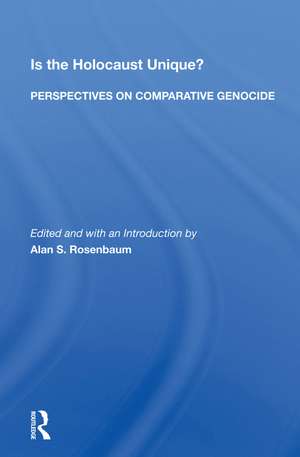Is the Holocaust Unique?: Perspectives on Comparative Genocide
Autor Alan S. Rosenbaumen Limba Engleză Hardback – 9 apr 2020
Preț: 769.77 lei
Preț vechi: 1030.67 lei
-25% Nou
Puncte Express: 1155
Preț estimativ în valută:
147.33€ • 151.83$ • 124.39£
147.33€ • 151.83$ • 124.39£
Carte tipărită la comandă
Livrare economică 01-15 martie
Preluare comenzi: 021 569.72.76
Specificații
ISBN-13: 9780367007140
ISBN-10: 0367007142
Pagini: 326
Dimensiuni: 146 x 222 mm
Greutate: 0.76 kg
Ediția:2
Editura: Taylor & Francis
Colecția Routledge
Locul publicării:Oxford, United Kingdom
ISBN-10: 0367007142
Pagini: 326
Dimensiuni: 146 x 222 mm
Greutate: 0.76 kg
Ediția:2
Editura: Taylor & Francis
Colecția Routledge
Locul publicării:Oxford, United Kingdom
Cuprins
Foreword -- Preface -- Introduction to the First Edition -- Introduction to the Second Edition -- The Ethics of Uniqueness -- Religion and the Uniqueness of the Holocaust -- From the Holocaust: Some Legal and Moral Implications -- The Uniqueness of the Holocaust: The Historical Dimension -- Responses to the Porrajmos: The Romani Holocaust1 -- The Atlantic Slave Trade and the Holocaust: A Comparative Analysis -- The Armenian Genocide as Precursor and Prototype of Twentieth-Century Genocide -- The Comparative Aspects of the Armenian and Jewish Cases of Genocide: A Sociohistorical Perspective -- Stalinist Terror and the Question of Genocide: The Great Famine -- The Holocaust and the Japanese Atrocities -- Applying the Lessons of the Holocaust -- The Rise and Fall of Metaphor: German Historians and the Uniqueness of the Holocaust -- Uniqueness as Denial: The Politics of Genocide Scholarship
Descriere
Evaluating the Jewish Holocaust is by no means a simple matter, and one of the most controversial questions for academics is whether there have been any historical parallels for it. Have Armenians, Gypsies, American Indians, or others undergone a comparable genocide? In this fiercely controversial volume, distinguished scholars offer new discussions of this question. Presenting a wide range of strongly held views, they provide no easy consensus. Some critics contend that if the Holocaust is seen as fundamentally different in kind from other genocides or mass deaths, the suffering of other persecuted groups will be diminished. Others argue that denying the uniqueness of the Holocaust will trivialize it. Alan S. Rosenbaum's introductions provide a much-needed context for readers to come to terms with this multi-dimensional dispute, to help them understand why it has recently intensified, and to enable them to appreciate what universal lessons might be gleaned from studying the Holocaust. This volume makes an important contribution to our comprehension of one of the defining events of modern history. It should be essential reading for scholars, students, and general readers interested in the Holocaust and its relationship to other instances of politically inspired mass murder.
